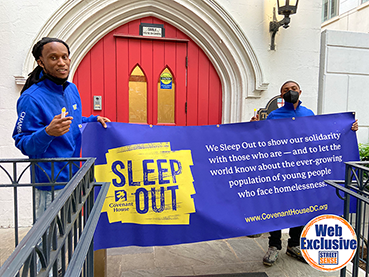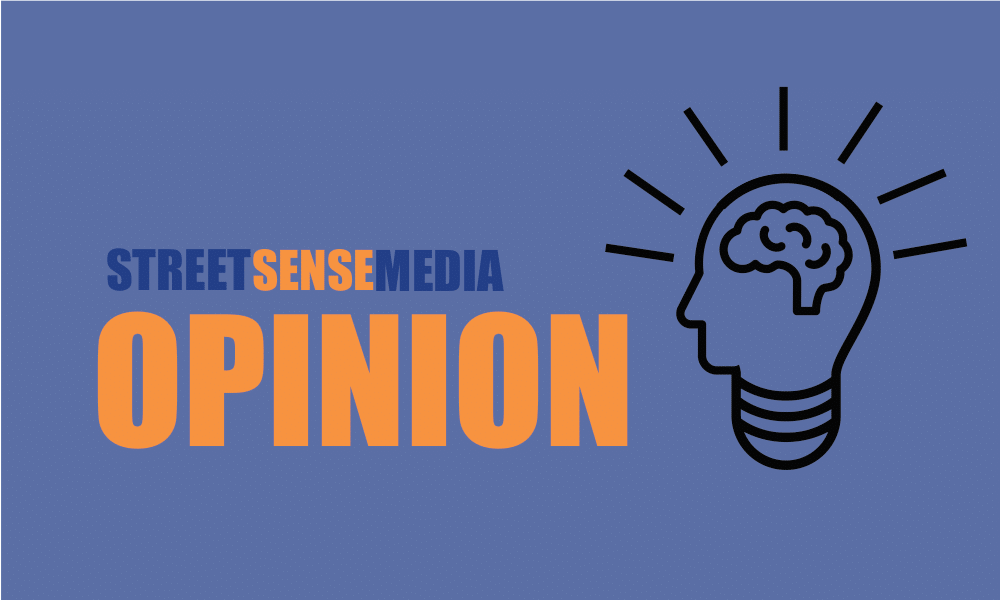About 40 people gathered in downtown D.C. on May 19 to take part in an overnight event to raise awareness of the growing plight of young people experiencing homelessness.
The evening began with a march to Freedom Plaza and a small candlelight vigil to honor the lives of unhoused youth who died in the previous year. Just as night fell, participants huddled together in the courtyard of a nearby church, where they slept outdoors for the evening in an activity that has come to be known as the “Sleep Out.” The annual gathering has taken place locally for at least 15 years, and is organized by the Covenant House, a local youth homeless services nonprofit.
This year’s activities took place amid the release of a new Metropolitan Washington Council of Governments study revealing that homelessness within the region is at the lowest point it has been in two decades. But even as the study’s findings show homelessness to be declining overall, it also reveals another startling trend.
Youth homelessness in D.C. has largely remained constant for the past four years. In 2018, 309 people between the ages of 18 and 24 did not have a place to call home. By 2022, that same population grew 14%, inching to a total of 351 people.
The same study made evident another concerning issue — about one-third of all transition-aged youth experiencing homelessness identify as LGBTQ. By comparison, the number of unhoused LGBTQ adults counted in the survey is much lower at about 9%.
“A lot of our youth have been put out, abandoned or thrown out on the street for their gender expression,” said Monroe Poston, a residential coordinator for the Covenant House.
A vast majority of the youth serviced by their programs identify as LGBTQ, Poston said.
Poston works specifically with the nonprofit’s 90-day residential program for LGBTQ youth, which focuses on getting young people housed and employed as soon as possible. In her experience, she said it is not a simple matter of handing over a key to someone. She underscored the importance of mental health and substance use counseling when providing housing services for unhoused young people.
“Addressing both of those issues is the main way that we can assist our youth with being able to sustain housing,” she said.
For some young people experiencing homelessness, finding a stable place to live is a simple matter of knowing where to look for help.
Eight months ago, Trevon Randolph did not have a place to live. What’s worse, he did not know where he could turn for help. Then, he found Covenant House.
“They helped me with finding new resources, they helped me get a new job, and getting connected with the right people,” Randolph said.
Today, he works as a concierge for a local real estate company and has his own apartment.
In opening comments at the event, Ward 8 Councilmember Trayon White shared a story about his own experience helping a young person navigate homelessness.
Some time the week prior, White, who is also running for mayor, said he received an unusual phone call from a youth he mentors.
At first, the young man did not want to admit that he was experiencing homelessness, White said.
“I said, ‘Is everything okay?’ And he said, ‘I don’t have anywhere to go,’” he said.
For White, this interaction reminded him of the sheer number of challenges young people experiencing homelessness may face while trying to carve a path for themselves. This person, he said, will soon be attending college on a scholarship and is already contending with a difficult set of obstacles.
“There are many like him on the streets of Washington, D.C. who are just trying to make a way through whatever circumstances they’re in,” he said.
On the way to the vigil, White spoke about the way he felt the latest homelessness statistics have been mischaracterized.
“Right now, the mayor is running a narrative that we are having the lowest homelessness in D.C., but we can’t talk like that. That’s like the narrative that crime is down,” he said. “You can’t address a problem unless you acknowledge there is a problem.”








